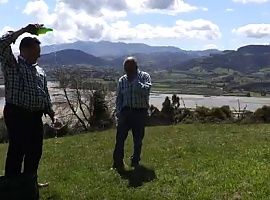Vigdís Finnbogadóttir, de Islandia, fue la primera mujer Presidenta electa en el mundo, ejerciendo su mandato entre 1980 y 1996. En la actualidad, en su calidad de Embajadora de Buena Voluntad de la UNESCO, continúa su infatigable trabajo en pos de los derechos de la mujer, la educación y la sostenibilidad.
Vigdís Finnbogadóttir está convencida de que las mujeres pueden salvar el planeta. Durante una conferencia reciente sobre la educación para las niñas y las mujeres, llevada a cabo en la UNESCO, compartió su optimismo contagioso con los otros ponentes, con el auditorio y, posteriormente, con EduInfo
You believe the future of the planet is in women’s hands.
Absolutely. Women can lift the world with the help and the friendship of men. But first we have to free the women. They are in fetters. To mobilize women to save the earth, information must be at hand. This means literacy, information, books and pamphlets to spread the word.
As RIO+20 approaches, do you see much pessimism about the state of the Earth?
It is true that there is cause for alarm. Human beings are a force of nature and are leaving destructive footprints all over the planet. We are undermining what keeps us alive. This was a constant theme at the recent UNESCO General Conference. I personally am very preoccupied with sustainable development: I have three granddaughters and I want to keep the planet safe for them.
But you remain optimistic. What explains your optimism?
We must underline that there is hope! If anything can save the world, women can.
Indigenous people speak of earth as a mother. Most languages speak of earth in the feminine: (la terre, la terra, la tierra …). Women live closer to nature, especially at the grassroots where environmental action is most effective. To succeed to save mother earth from further catastrophes we must mobilize the women. That is why the importance of education, specifically women’s literacy, is paramount.
Is educating girls and women then the first step to saving the world?
Yes. Education strengthens the self. You learn not only about the world but yourself and what you can do. Schools must be safe places for girls. When they can read and write and appreciate the meaning of words, they gain the confidence that the world needs them and that they can help the world.
I have participated in many women’s literacy campaigns and I am fascinated to see women literally become taller when they learn to read and write. Then they convey knowledge to the youth. I am confident that countries with literacy high on the agenda will join hands to make women’s literacy a reality.
How can women be encouraged to participate more in public life?
Role models are hugely important. After I was elected President of Iceland in 1980, a women’s party was started. At the time there were only two women in parliament. Today 43 % of parliamentarians are women! Iceland is at the top of the OECD tables for women’s participation in public life.
We were late to realize the power of a woman’s mind.
Can men be persuaded to share power and decision-making with women?
Men have monopolized knowledge, but we should not work against them, but with them, starting with our fathers and brothers. They need to be encouraged to promote women and accept their equal knowledge and intelligence. Men are our friends: we have to stand beside them, not behind them. Equality is impossible without the friendship and help of men and boys.
You encourage women to be leaders. How can governments make this possible?
Governments believe you should listen to men! But we should equally listen to women. The problem is always at the top. Leaders should set an example. Leadership training is now available for women at the Centre for Women’s and Gender Studies at the University of Iceland. It promotes research and shares knowledge on women’s issues and gender studies. Women come there from Africa, East Asia and Afghanistan to do leadership training.




















